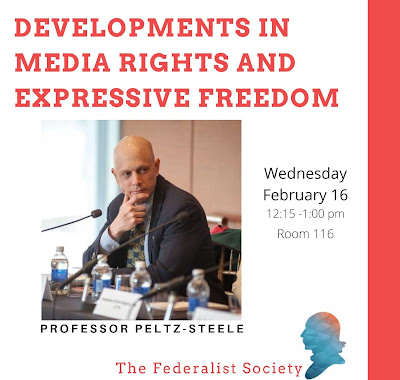 |
| Abortion rights rally at Stanford Law in 2022. (Suiren2022 via Wikimedia Commons CC BY-SA 4.0) |
There are video and audio recordings aplenty on the internet if you want to learn more about what happened March 9. Here's David Lat with the play by play. For my money, the take-away is that a guest federal judge was treated disrespectfully—dare I say uncvilly?—in an effort to silence him, and even a school administrator joined in the effort. That must have been the dean's take, too, when she issued an apology to Duncan, which drew a disruptive protest of her office in turn.
Martinez's letter is masterful and worth a read for the First Amendment refresher and expression of commitment to academic freedom at even a private school. She put the protesting administrator on leave and pledged mandatory educational programming for the student body on free speech and legal professionalism.
Frankly, I was shocked. I do not expect deans in today's legal academy to stake out clear and strong positions on, well, anything other than which way the wind is blowing.
Today Duncan appeared at Notre Dame Law School and talked about the incident. His remarks and the Q&A livestreamed and are available on YouTube. To be fair, many renditions of what went down at Stanford report rudeness from both sides, whoever struck the first blow. However so, there was none of that at Notre Dame. Duncan's remarks were unremarkable, but that struck the right tone. The thrust of his assessment was that zealous disagreement is laudable, but shouting down one's opponent or merely vituperating one's ideological adversary does nothing to enrich the marketplace of ideas. Like me here, he lauded Martinez's letter.
In a curious coincidence, and really the only reason I throw my two-cent hat into this ring, I today (at last) finished legendary lawyer Robert Corn-Revere's superb 2021 book, Mind of the Censor and Eye of the Beholder: The First Amendment and the Censor's Dilemma. The book could not be more on point in the Duncan matter.
Mind of the Censor is chock full of engaging prose and a paean to the freedom of expression in our troubled times. But it's the final chapter that delivers the biggest bang for the buck with a delightful Jeff Foxworthy-esque list of 10 reasons to suspect "you might be a censor." And apropos of Duncan's comments today, Corn-Revere's number 8 reads, "You Might Be a Censor if You Believe that Silencing Speech You Dislike Is the Exercise of Your Rights."
I wrote just this week about "civility" being deployed as a new, conveniently vague code word to suppress academic freedom. To be clear, I wasn't speaking against civility. The problem arises in the misuse of the word to differentiate speech one wants to hear from speech one does not want to hear.
It's OK to disagree with Duncan, indeed, to disagree vehemently. He spoke today of the challenge all judges face in remaining open to the possibility that they are wrong in their preconceptions. Civility is about respecting other people regardless of agreement or disagreement, and acting ethically, accordingly. Thus, willingness to hear challenges to our thinking is part and parcel of civility and goes hand in hand with an expectation that others will hear our challenges, too.
I'm really not wrong about this.
.png)

